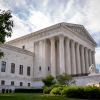
A man casts his ballot in a box during early voting in Waukesha, Wis, on March 18, 2025.
Jeffrey Phelps/AP
hide caption
toggle caption
Jeffrey Phelps/AP
President Donald Trump has enacted a new executive order mandating that potential voters present proof of citizenship for voter registration. This sweeping order challenges the extent of Trump’s presidential powers.
Voting rights activists express concern that these new regulations could disenfranchise millions of Americans, arguing Trump lacks the legal justification for such changes.
The order states that the United States “fails to uphold essential election safeguards.”

The order proposes revisions to the federal voter registration form, mandating that registrants provide proof of citizenship, such as a passport, to a local or state authority.
States have historically held significant discretion over the management of their elections. Although the federal government has occasionally imposed minimum standards for federal elections, this is typically achieved through legislation.
The order additionally necessitates states to eliminate noncitizens from voter registration lists, urges states and federal bodies to collaborate on prosecuting electoral offenses, and allows federal agencies, including the director of the Department of Government Efficiency, to verify state voter rolls “for alignment with Federal standards.” It also instructs federal agencies to share data with states, such as immigration and Social Security information, to help states verify the eligibility of individuals on their voter rolls.

Advocates for voting rights, however, caution that outdated databases can mistakenly classify naturalized citizens as noncitizens. Past attempts by states to cleanse their voter rolls of noncitizens have inadvertently excluded eligible U.S. citizens as well.

The executive order also aims to prevent states from accepting mail-in or absentee ballots received after Election Day by threatening to withhold funding from those states that permit such ballots to be counted.
Proof of Citizenship Requirement
In the lead-up to the 2024 election, Trump and his supporters promoted unfounded fears about the potential for noncitizens to vote in substantial numbers.

The existing federal voter registration form requires applicants to affirm, under penalty of perjury, their U.S. citizenship and eligibility to vote, alongside providing a driver’s license number, state ID number, or social security number. Individuals attempting to vote unlawfully may face imprisonment, fines, or deportation. However, historical audits and studies indicate that such occurrences are exceedingly rare.
Nonetheless, Republicans have prioritized the mandate for documentary proof of citizenship. The executive order heavily draws from the Republican-backed Safeguard American Voter Eligibility Act, or SAVE Act. House Republicans have indicated their intention to pass it, although its prospects in the Senate are uncertain.
This executive order demonstrates that Trump is not waiting for Congressional action. Yet, legal scholars argue that he lacks the authority through executive order to implement such changes, with the order conflicting with prevailing federal voting regulations.
“It’s illegal at numerous levels,” stated Sean Morales-Doyle, the voting rights director at the Brennan Center for Justice, a nonprofit dedicated to studying and promoting voting rights. The order instructs the Election Assistance Commission, a small independent bipartisan agency, to enact various changes, including to the federal voter registration form, but Morales-Doyle asserts that the president does not have the authority to direct that commission’s actions.
The imposition of documentary proof of citizenship would fundamentally disrupt voter registration processes if enacted.
The order explicitly applies to anyone utilizing the federal voter registration form. However, it remains ambiguous whether the order would also encourage states to impose proof of citizenship requirements on their state registration forms, potentially by threatening funding cuts.

The order exclusively identifies a limited set of options for proving U.S. citizenship. Acceptable proofs include a U.S. passport, an ID meeting the REAL ID Act requirements indicating citizenship, or a military identification confirming citizenship. Additionally, it allows for a valid government photo ID that “demonstrates that the applicant is a United States citizen or if such identification is accompanied by proof of United States citizenship,” although it does not clarify whether a birth certificate would be considered valid.
Morales-Doyle emphasized that the omission of birth certificates in the list of acceptable proofs of citizenship aligns with another Trump directive aimed at restricting birthright citizenship.
Approximately half of Americans possess a U.S. passport, and only five states currently issue enhanced driver’s licenses demonstrating proof of citizenship.